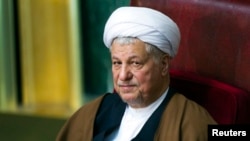Former president Akbar Hashemi Rafsanjani has accused Iran's leadership of incompetence and ignorance just days after he was barred from standing in an election next month, the opposition Kaleme website reported on Thursday.
Rafsanjani's comments appeared to add to the political conflict between those loyal to the leadership and opposition groups who have been marginalized since post-election unrest in 2009.
“I don't think the country could have been run worse, even if it had been planned in advance,” Rafsanjani said to members of his campaign team on Wednesday, according to the Kaleme report. “I don't want to stoop to their propaganda and attacks but ignorance is troubling. Don't they understand what they're doing?”
Before he was disqualified from next month's presidential election, the 78-year-old Rafsanjani caused high interest in a ballot many believe was a race between hardliners. He attracted the endorsement of reformist groups whose leaders had disputed the re-election of President Mahmoud Ahmadinejad.
Rafsanjani did not indicate specifically who he was addressing but after the unrest following Ahmadinejad re-election in 2009, he criticized the authorities' heavy-handed response and has since been regarded as a threat to the establishment.
The two-term president warned of “dangerous” threats from the United States and Israel, which have threatened to use military action against what they suspect is Iran's development of nuclear weapons.
He said he had not realized his candidacy would create a wave in the country but that it was a sign of people's despair. Now was the time to stay calm, he said.
“In no instance should people despair. There will be a day when those who must come, will come,” he said, an apparent reference to advocates for political and social reforms who have been sidelined.
With Rafsanjani and Ahmadinejad's close ally, Esfandiar Rahim Mashaie, now out of the picture, the election field is again dominated by hardliners loyal to Iran's clerical leader, Ayatollah Ali Khamenei.
Rafsanjani's ally Hassan Rohani, a former nuclear negotiator, and reformist Mohammad Aref, remain in the contest.
Rafsanjani said the experiences of rebuilding the country after the Iran-Iraq war was one that was needed now. He was elected president in 1989, a year after the war ended, and his administration came to be called the “government of reconstruction”, an era when economic rebuilding and reform put Iran back on its feet.
“The foreigners called me “easy man” because it took no time before the doors opened. Now that experience could be easily used again, except back then, people were sympathetic.”
According to the report, Rafsanjani - regarded as one of the founding fathers of the Islamic Republic - said he should not have run.
“There was a flood of letters and telephone calls from Najaf, Qom and Mashhad, all major clerics for my candidacy. How could I be so obstinate and say no to them, especially to the youth?”
Analysts say he was disqualifed from the election because the campaign had already become hugely popular and he was regarded as a threat to the leadership.
Rafsanjani's comments appeared to add to the political conflict between those loyal to the leadership and opposition groups who have been marginalized since post-election unrest in 2009.
“I don't think the country could have been run worse, even if it had been planned in advance,” Rafsanjani said to members of his campaign team on Wednesday, according to the Kaleme report. “I don't want to stoop to their propaganda and attacks but ignorance is troubling. Don't they understand what they're doing?”
Before he was disqualified from next month's presidential election, the 78-year-old Rafsanjani caused high interest in a ballot many believe was a race between hardliners. He attracted the endorsement of reformist groups whose leaders had disputed the re-election of President Mahmoud Ahmadinejad.
Rafsanjani did not indicate specifically who he was addressing but after the unrest following Ahmadinejad re-election in 2009, he criticized the authorities' heavy-handed response and has since been regarded as a threat to the establishment.
The two-term president warned of “dangerous” threats from the United States and Israel, which have threatened to use military action against what they suspect is Iran's development of nuclear weapons.
He said he had not realized his candidacy would create a wave in the country but that it was a sign of people's despair. Now was the time to stay calm, he said.
“In no instance should people despair. There will be a day when those who must come, will come,” he said, an apparent reference to advocates for political and social reforms who have been sidelined.
With Rafsanjani and Ahmadinejad's close ally, Esfandiar Rahim Mashaie, now out of the picture, the election field is again dominated by hardliners loyal to Iran's clerical leader, Ayatollah Ali Khamenei.
Rafsanjani's ally Hassan Rohani, a former nuclear negotiator, and reformist Mohammad Aref, remain in the contest.
Rafsanjani said the experiences of rebuilding the country after the Iran-Iraq war was one that was needed now. He was elected president in 1989, a year after the war ended, and his administration came to be called the “government of reconstruction”, an era when economic rebuilding and reform put Iran back on its feet.
“The foreigners called me “easy man” because it took no time before the doors opened. Now that experience could be easily used again, except back then, people were sympathetic.”
According to the report, Rafsanjani - regarded as one of the founding fathers of the Islamic Republic - said he should not have run.
“There was a flood of letters and telephone calls from Najaf, Qom and Mashhad, all major clerics for my candidacy. How could I be so obstinate and say no to them, especially to the youth?”
Analysts say he was disqualifed from the election because the campaign had already become hugely popular and he was regarded as a threat to the leadership.





